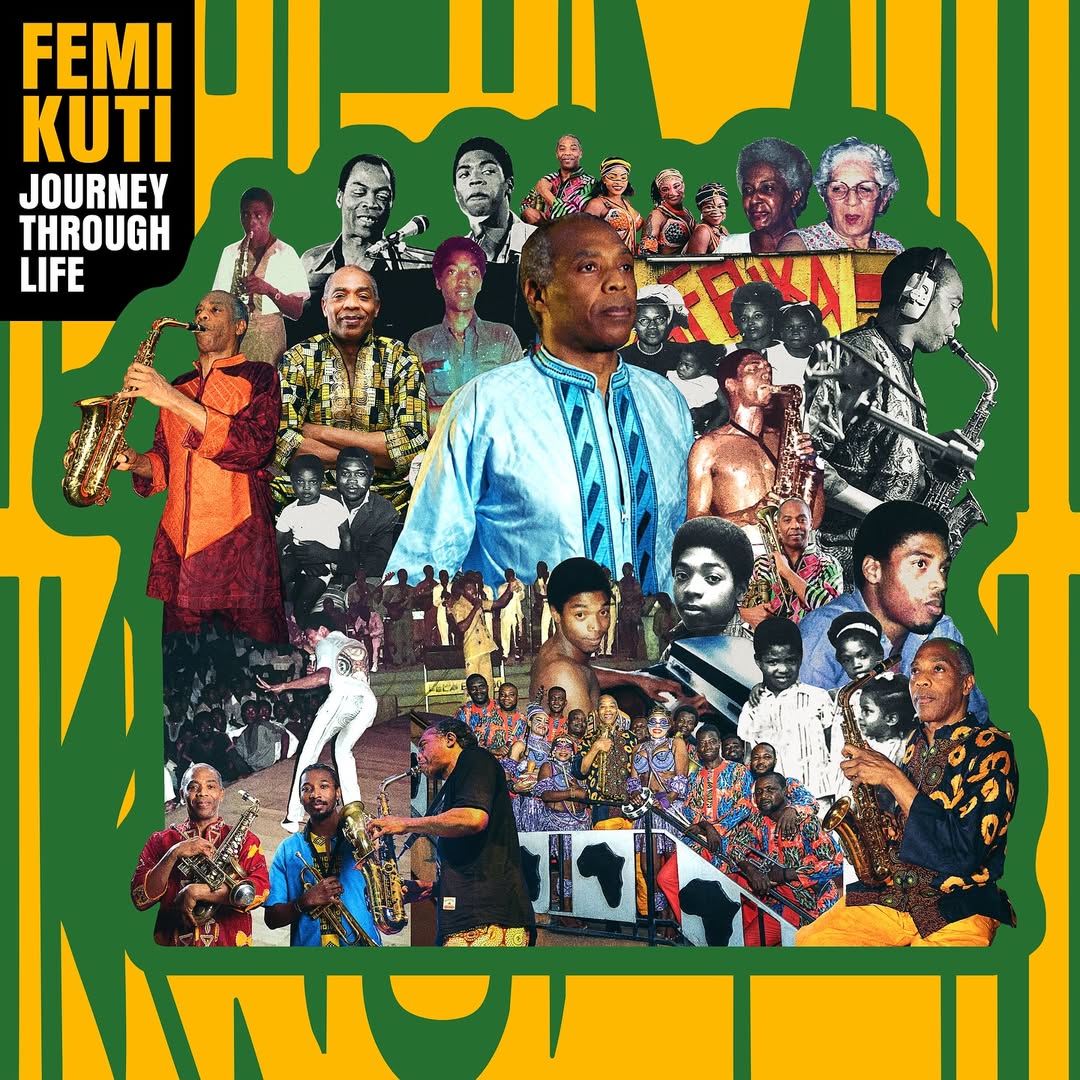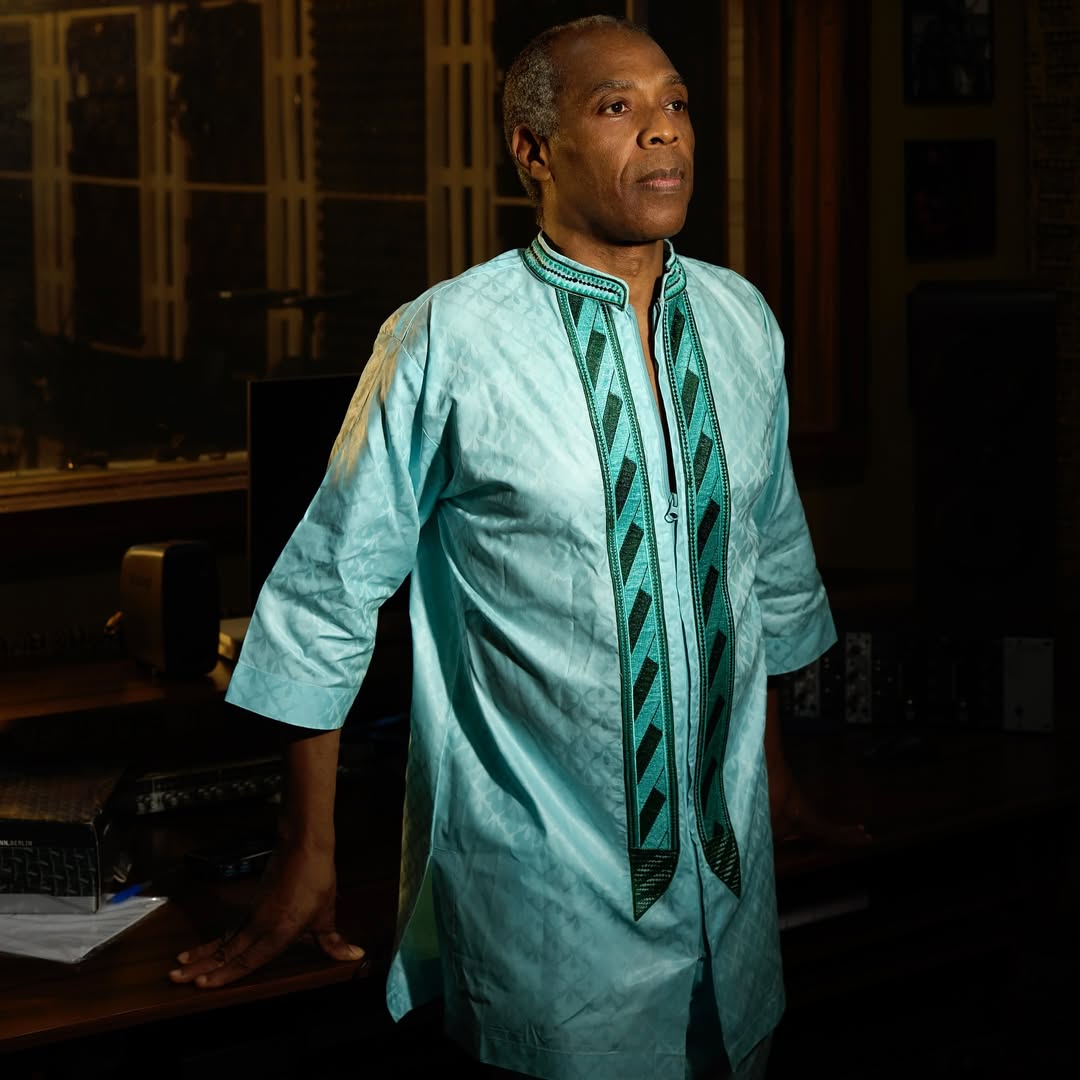Journey Through Life demands to be heard, understood, and, perhaps more importantly, acted upon.
By Emmanuel ‘Waziri’ Okoro
Nigerian—and by extension, West African music—cannot be examined from a thorough historical standpoint without mentioning one of its most prolific progenitors and pioneers, Fela Anikulapo Kuti. Widely known as the father of Afrobeat, Kuti has, over the last three decades, also been cited as a major inspiration for Afrobeats–the popular music now coming out of the region. While people often make the mistake of conflating the two genres, one can easily distinguish them by their core sonic elements, arrangement, and, in most cases, lyrical depth.
But this is not a piece about Kuti’s impact on the music scene, nor is it a review of any of his numerous classic albums. This is a review of Journey Through Life, a recent album by another Kuti—one who is expanding the soundscape of Afrobeat.
Femi Kuti, Fela’s eldest son, had the privilege of learning the ropes from his larger-than-life father. He began playing the saxophone and keyboard for his father’s band, Egypt 80, from his mid-teens. Later, he branched out and established his own band, Positive Force, unburdened by the weight of his father’s towering musical legacy.
Over time, Kuti has become a legend in his own right, continuing the music and activism his father once championed. He has garnered both local and international acclaim, achieved commercial success, and become a force to be reckoned with. All of these motions have resulted in him scoring several high-profile collaborations, including work with Dele Sosimi, Mos Def, Common, Nile Rodgers, Roy Hargrove, The Soultronics, D’Angelo, Sound Sultan, 2Baba, Wizkid, and even his own son, Made Kuti.
Keeping up with Kuti’s expansive discography is quite a herculean task, but one thing is certain: Journey Through Life is a statement project that is a social commentary on the issues plaguing Nigeria across ten tracks—some of which were re-recorded—with a runtime of 48 minutes.
The album opens with its eponymous title, with high-octane drums, groovy bass guitar, trumpets, and the brilliance of a saxophone reverberating across its duration. As is expected from a typical Afrobeat number from an Afrobeat artiste, instrumentation takes up most of the track before Femi Kuti’s vocals finally break through. His words are laced with wisdom, delivered with a reflective, almost armchair-like ease, in lines such as: “Don’t hold on to material things too tight / ’Cause you gonna let go after a while / Keep all your loved ones by your side / They are all that will matter in time.” It’s a fitting opener to the album, as it explores some of the truths he has lived by.

Laid-back syncopation ushers in “Chop and Run”, a track that addresses some of the major ills plaguing Nigeria—chiefly the political class, which Femi Kuti, in hindsight, identifies as the root of the country’s problems. Lines like “Soldier burn Fela house/ Throw Fela mama from window/ The injury later kill Fela mama/ Government say na unknown soldier” rehash the dreadful incident that led to the death of his grandmother, educator and women’s rights advocate, Chief Funmilayo Ransome-Kuti. It’s a painful memory that also inspired Fela’s 1981 track, “Coffin for Head of State”. Femi Kuti extends this commentary by referencing recent examples of such brazen abuse of power, as if to say that nothing about Nigeria shocks him anymore.
Afrobeat, at its core, is rallying activism—and it is damning when one realises that many of the issues Fela criticised in his heyday remain deeply entrenched nearly three decades after his death. On “After 24 Years”, Kuti offers a scathing social commentary on the nation’s socio-economic landscape since its return to democracy at the turn of the millennium. Over the mid-tempo composition, he calls out the recycled political class, accusing them of bastardising the country through corruption, lining their pockets instead of delivering the dividends of democracy to the people who voted them into power. “Corruption na Stealing” is a commentary on how large-scale corruption in Nigeria is often whitewashed to downplay its impact, using phrases like ‘embezzled’ or ‘diverted’ instead of simply calling it what it is: stealing.
Journey Through Life reaches its midpoint with “Politics Don Expose Them”, a fast-paced bop driven by a simmering bassline and layered saxophone notes that heighten its intensity. It’s a call-and-response track, with Femi Kuti shedding light on how political power has exposed the political class for what they truly are. “Before politics, many of them no get work before/ Politics was the only way for them to get free chop”, he laments, exposing how the ruling class lacks the capacity and experience to lead.

“Shotan” comes alive with a blend of sonic elements that create a backdrop bursting with moshpit-esque energy. Kuti’s lyricism, in hindsight, is an ‘I told you so’, reflecting on how his family had warned Nigerians against voting in a certain president—whom he explicitly name-drops—someone many Nigerians have come to regret electing. On “Oga Doctor”, Kuti advocates for more female doctors to be involved in the treatment of women, expressing concern over male doctors who may be conducting invasive procedures that cross ethical lines.
Over traditional percussion and sonic elements, “Last Mumu” sees Kuti deliver a missive to Nigerians and Africans who, in the grand scheme of socio-economic development, are often the last to drive innovations that could empower their own lives. While Journey Through Life exposes some of the external issues that has plagued Nigeria, Kuti looks inward for solutions on “Work on Myself”, one of the album’s standout gems. Over lush electric and bass guitar notes, Kuti begins with “Maybe we fit nor change the world/ But we can change the world within us”. It’s a powerful sentiment reinforced by the chorus, “Yes, I’m going to work on myself”.
Journey Through Life is bookended with “Think My People Think”, featuring traditional shakers, percussion, and sonic elements that meld seamlessly with pulsating drums. Kuti, assisted by backing vocals, urges Africans to know and embrace their history, rather than imitate foreign identities. “Tell me why Chinese man nor dey bear Olakunle/ Why Lebanese man nor dey bear Ogedengbe”, he questions, highlighting the irony of Africans abandoning their roots in pursuit of validation from the West. He challenges the colonial hangover that still shapes Africans’ perception of self-worth, beauty, and progress. “Think My People Think” is a befitting closer that encapsulates Journey Through Life’s core messaging: that liberation begins with the mind.

With Journey Through Life, Femi Kuti delivers a deeply personal and politically charged body of work that builds on his family’s rich legacy of musical activism. The project is both retrospective and forward-looking, in that Kuti reflects on his own journey while casting a critical eye on Nigeria’s political scene.
From scathing indictments on corrupt leadership on tracks like “After 24 Years” and “Corruption na Stealing”, to calls for individual and collective self-awareness on “Think My People Think”, “Work on Myself”, and “Last Mugu”, Journey Through Life is a honest and unflinching portrait of a nation in crisis, and a people in search of themselves. What makes the messaging better is its rich instrumentation, which stays true to Afrobeat tradition, yet also meshes with contemporary urgency.
Journey Through Life demands to be heard, understood, and, perhaps more importantly, acted upon.
Lyricism – 1.5
Tracklisting – 1.4
Sound Engineering – 1.8
Vocalisation – 1.4
Listening Experience – 1.6
Rating – 7.7/10
Emmanuel ‘Waziri’ Okoro is a content writer and journo with an insatiable knack for music and pop culture, with bylines on Afrocritik, PM News Nigeria, ThisDay Live, and The Guardian. When he’s not writing, you will find him arguing why Arsenal FC is the best football club in the multiverse. Connect with him on Twitter, Instagram, and Threads: @BughiLorde




